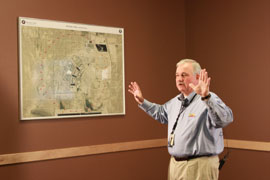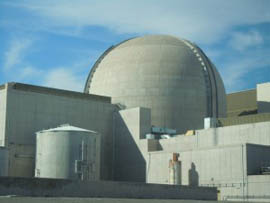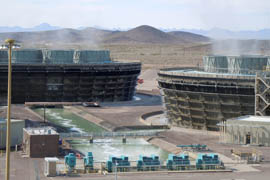Cronkite News has moved to a new home at cronkitenews.azpbs.org. Use this site to search archives from 2011 to May 2015. You can search the new site for current stories.
One year after Fukushima disaster, APS says Palo Verde is safe
BUCKEYE – A year after the Fukushima Daiichi nuclear disaster, operators of Palo Verde Nuclear Generating Station said Friday that events in Japan prompted new initiatives to prepare for emergencies.
“We’re adamant that we’re going to take a safe industry and make it even safer by applying those lessons learned,” said Randy Edington, executive vice president and chief nuclear officer of Arizona Public Service.
APS invited reporters to its emergency operations center here for a “Palo Verde safety update.”
Shortly after the 9.0 magnitude earthquake and tsunami hit Japan’s east coast last year, APS created a response team to identify “Fukushima initiatives.”
“Palo Verde and Fukushima – we are as different as they come,” Edington said. “But we’re not relying those differences. We’re taking those differences and understanding them and looking for any similarities.”
Located 50 miles west of Phoenix, Palo Verde is the largest nuclear generating station in the U.S., supplying energy to about 4 million people in Arizona, California, New Mexico and Texas. Its operator, APS, owns nearly 30 percent of the plant.
Edington said that Palo Verde is in a unique situation because the likelihood it would be hit by a devastating natural disaster is very small.
In the past year Palo Verde has purchased more portable emergency equipment, developed a strategy to cool down reactors in absence of power, rewritten emergency guidelines and conducted more comprehensive safety drills, he said.
“We didn’t wait. We started buying equipment and upgrading procedures,” Edington said.
Michael Powell, who directs the Fukushima initiatives at APS, said the first task of the team was to assess the plant’s “robustness” and come up with new safety regulations.
“We always want to keep the core stable,” he said, adding that APS plans to continue with its safety drills and practices indefinitely.
APS also purchased five new fire trucks that can be operated by a single person, portable generators, portable pumps and other emergency response equipment.
“Reliable backup portable equipment is key,” Powell said.
Diane Brown, executive director of the Arizona Public Interest Research Group, recognized that operators have improved safety at Palo Verde over the years but said nuclear energy is “inherently dangerous” and not worth the risk.
“While Arizona hasn’t experienced tsunamis or earthquakes that could immediately impact Palo Verde today, it doesn’t mean that Arizona is immune to any natural disaster in the future, which could include an earthquake, flooding or a major dust storm,” she said in a telephone interview.









